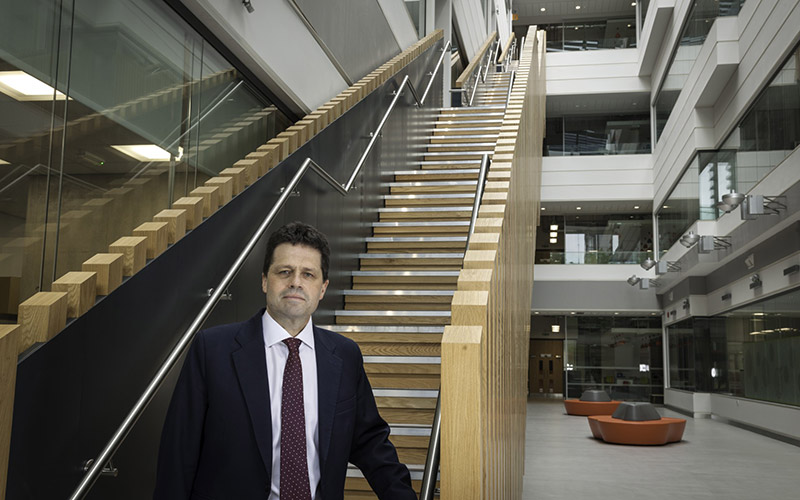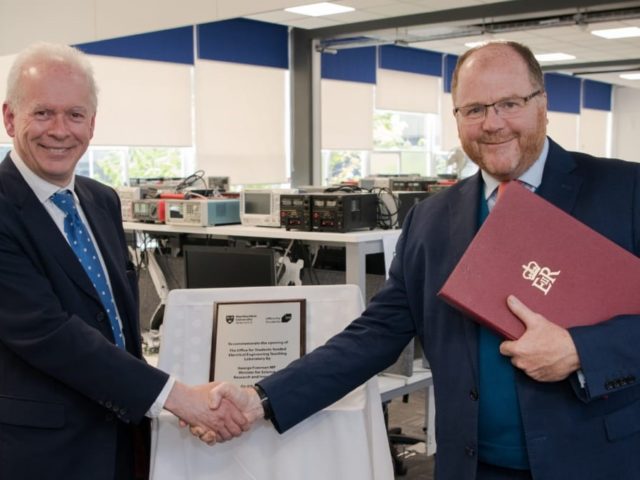Professor Matt Rosseinsky, from the University of Liverpool’s Department of Chemistry and the Materials Innovation Factory, has been awarded the Royal Medal for the Physical Sciences by the Royal Society.
Professor Rosseinsky has been recognised for his pioneering contribution to the design and discovery of materials, changing our understanding of synthesis to create function with digital tools.
Materials underpin the technologies we use every day, such as mobile phones and electric vehicles.
Professor Rosseinsky is developing new ways to find the materials that are needed to meet pressing global challenges such as clean energy and sustainable manufacturing.
His research demonstrates how artificial intelligence, directed by expert chemical insight, can produce new materials with properties that change our understanding, beyond simple variations of those we already know. Importantly, these materials are actually synthesised in the laboratory to demonstrate their discovery.
On receiving his award, Professor Rosseinsky said: “I am deeply honoured and humbled to receive the Royal Medal for Physical Sciences from the Royal Society.
“This award reflects the huge role materials chemistry – and condensed matter science more broadly – plays in our everyday lives. I want to take the opportunity to highlight the support and contribution of numerous people and organisations to my work over the past 25 years.
“These include the multidisciplinary team of colleagues that I work with in the Department of Chemistry and at the University of Liverpool.
“I’d also like to highlight the support of academic collaborators and industrial partners, in particular Unilever, Johnson Matthey, Ceres Power and NSG Pilkington, as well as the funders of our research including EPSRC and the Leverhulme Trust. This support has been indispensable for the development of work on artificial intelligence for materials design and discovery at the University’s Materials Innovation Factory.”
Sir Adrian Smith, President of the Royal Society, said: “The recipients of this year’s medals and awards have all made outstanding contributions to science and its applications for the benefit of humanity.
“They have done so by furthering our understanding of the processes that govern the world around us, changing the practices of academia to build a more robust and inclusive research environment, and engaging new audiences.
“Celebrating these diverse contributions is core to the Society’s mission and I offer my congratulations to all the 2025 recipients.”
Professor Matt Rosseinsky joined the University of Liverpool in 1999 as Professor of Inorganic Chemistry. He holds an MA and D. Phil from the University of Oxford and was elected a Fellow of the Royal Society in 2008.
His career has been marked by numerous prestigious awards, including the inaugural de Gennes Prize for Materials Chemistry from the Royal Society of Chemistry in 2009, the Royal Society’s Hughes Medal and Davy Medal, and the 2023 Eni Energy Frontiers Award for the digital design and discovery of next-generation energy materials.
In 2024, he was awarded the OBE for services to materials chemistry research and innovation. He also served as a member of the Governing Council of the Engineering and Physical Sciences Research Council.
Three Royal Medals are awarded every year, for the most important contributions in the physical, biological and applied sciences. Since 1826, they have recognised some of the most eminent scientists including Francis Crick, Frederick Sanger and Max Perutz.
Founded in 1660, the Royal Society is a fellowship of many of the world’s most eminent scientists and is the oldest scientific academy in continuous existence.




